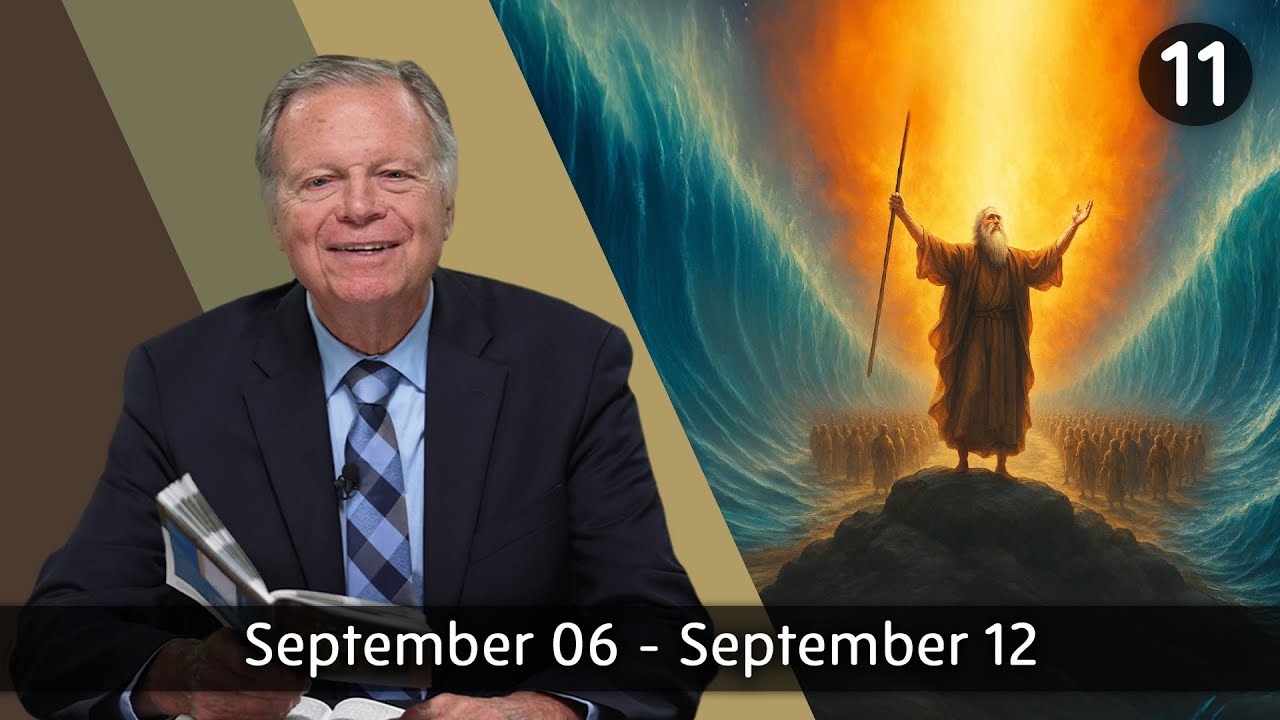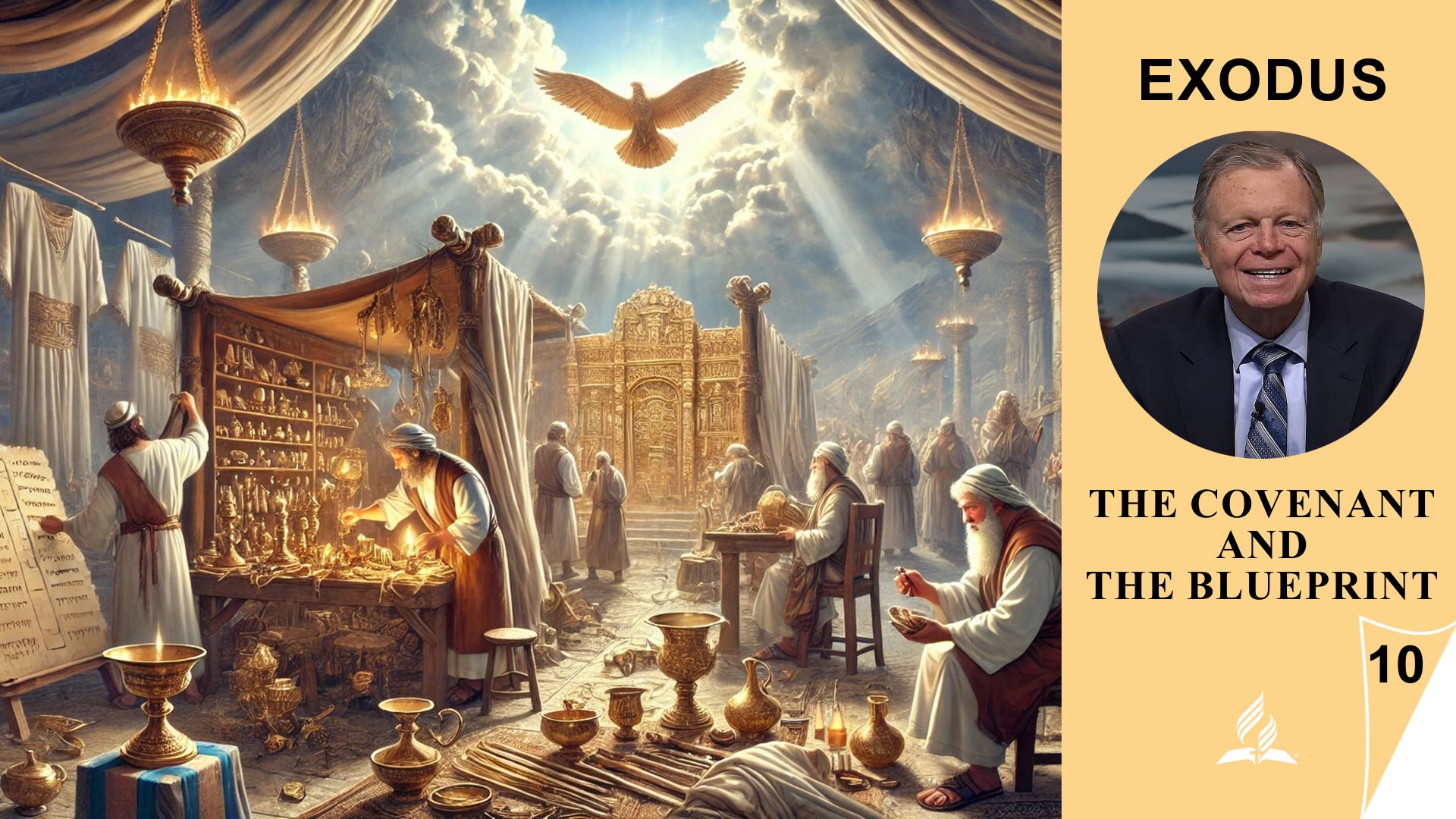
🌍 Adventist News Network – September 5, 2025: Adventists in Argentina Deliver Relief Kits After Storm & More News
 Adventist News Network – September 5, 2025: Adventists in Argentina Deliver Relief Kits After Storm & More News |
Adventist News Network – September 5, 2025: Adventists in Argentina Deliver Relief Kits After Storm & More News |
This week on ANN: |
· After a severe storm in Argentina, Adventist food company employees deliver relief kits; in Bulgaria, a Pathfinder Club marks 30 years in the mountains; in Egypt, a youth camp builds leaders through sports and music; and in Romania, ADRA distributes 5,000 backpacks to curb school dropout.
· Stay tuned as ANN brings everything you have to know about what is happening in the church worldwide.
Exodus – Lesson 10.The Covenant and the Blueprint | Sabbath School with Pastor Mark Finley

Series EXODUS with Pastor Mark Finley
Lesson 10.The Covenant and the Blueprint
A God Who Connects, Dwells, and Transforms
God never makes a covenant without purpose – His desire has always been to dwell among His people and draw them into fellowship with Himself. In Lesson 10, we discover how the covenant at Sinai was confirmed not only through words and blood, but through a living relationship. The sanctuary that God commanded was to be a visible sign of His nearness – a place where His holiness, grace, and redemption could be experienced. Yet this blueprint was more than symbolic: it pointed to Christ – the true sacrifice and the source of true communion. Even today, God equips people with His Spirit to serve Him – in obedience, beauty, and love. The covenant remains an invitation to a genuine, deep relationship with a holy and gracious God.
Content:
10.1 The Book and the Blood
Covenant of Grace – Relationship, Not Just Obedience
The covenant at Sinai was not a mere legal contract but the expression of a profound relationship between God and His people. The reading of the law reminded Israel of God’s will, while the blood symbolized the grace that made obedience possible. Israel sincerely promised to obey, yet without fully understanding its own weakness. Only through Jesus’ sacrifice – foreshadowed by that blood – can true obedience grow from grace. The covenant shows that God seeks not perfection, but relationship. Even today, we depend on that same grace to live what our lips confess.
10.2 Seeing God
Encountering God – and Yet Falling?
The elders of Israel experienced something astonishing: they saw God and ate in His presence – a symbol of intimate fellowship. Yet, even such closeness did not protect them from later failure. This reveals that sacred experiences or spiritual privileges cannot replace genuine heart transformation. God invites us into relationship, not merely awe. Those who commune with Him are also called to repentance and faithfulness. For believers today, this stands as a warning: light without humility can lead to darkness if it does not result in change.
10.3 Power to Obey
Obedience – God’s Work Within Us
True obedience does not arise from human effort but from God’s work within. Ezekiel describes how God removes the heart of stone and gives a living heart – able to hear, love, and obey. Our role is to surrender daily and accept His leading. Obedience is therefore not a human achievement but a gift of grace made effective by the Holy Spirit. When God commands, He also empowers. The greatest challenge remains: to die to self so that Christ may live and act within us.
10.4 In the Midst of His People
A God Who Dwells – Not Just Reigns
God desired more than obedience – He wanted to dwell among His people. The sanctuary was the expression of that nearness: a place where His presence could be seen and felt. Every aspect of the sanctuary pointed to Jesus and the plan of salvation to come. Though He fills heaven, God humbles Himself to be present with us – a profound act of grace. The sanctuary’s construction from freewill offerings showed that God’s nearness depends on relationship and dedication. Today, He desires to dwell not in buildings but in hearts that make room for Him.
10.5 Filled With the Spirit of God
The Holy Spirit – Power for Service, Beauty, and Holiness
For the construction of the sanctuary, God not only empowered Moses but filled Bezalel, Oholiab, and others with His Spirit – giving them wisdom, artistry, and understanding. This shows that the Spirit works not only in preaching but also in creative, practical service for God. At the same time, the Sabbath remained a central sign of sanctification – not as human effort, but as a testimony of divine transformation. The highest expression of God’s gift was the law, written on stone by His own hand and placed beneath the mercy seat. This arrangement reveals a profound truth: God’s grace stands above His law – not in opposition, but as hope for all who struggle with weakness. The Spirit works in us so that we may honor God in all things – with heart, hands, and life.
10.6 Summary
God’s Nearness – Grace, Law, and Presence
Lesson 10 shows that God’s covenant is not just about words but about relationship, nearness, and transformation. Through the shed blood and the written word, the covenant with Israel was confirmed – yet its true power lies in God’s grace. The tabernacle was a sign that God longed to dwell among His people. He even filled craftsmen with His Spirit so His presence could be made visible and tangible. Obedience, sanctification, and creativity are not human works but expressions of divine activity within us. Above all stands His law – protected beneath the mercy seat – showing that God’s justice is always upheld by His mercy.
🌍 Adventist News Network – August 29, 2025: A Woman Found Hope in the Adventist Radio & Other Global News
 Adventist News Network – August 29, 2025: A Woman Found Hope in the Adventist Radio & Other Global News |
Adventist News Network – August 29, 2025: A Woman Found Hope in the Adventist Radio & Other Global News |
This week on ANN: |
· A woman finds hope through the Seventh-day Adventist radio in North Korea, churches become shelters on the border between Cambodia and Thailand, an Adventist college student runs over 100 miles in 5 days to raise funds for the fight against cancer in Australia, and over 600 young Adventists gather in Poland.
· Stay tuned as ANN brings everything you have to know about what is happening in the church worldwide.
🌍 Adventist News Network – August 22, 2025: Remote Colombian Villages Embrace the Gospel & More Global News
 Adventist News Network – August 22, 2025: Remote Colombian Villages Embrace the Gospel & More Global News |
Adventist News Network – August 22, 2025: Remote Colombian Villages Embrace the Gospel & More Global News |
This week on ANN: |
· From 11 remote Colombian villages embracing the gospel with 700 baptisms, to thousands of women mobilizing for mission in Angola, and student-led outreach in Papua New Guinea. Plus, AWR stories transforming lives in Madagascar and the Philippines, and standout Adventist school in Cairo.
· Stay tuned as ANN brings everything you have to know about what is happening in the church worldwide.
- « Previous Page
- 1
- …
- 18
- 19
- 20
- 21
- 22
- …
- 704
- Next Page »
